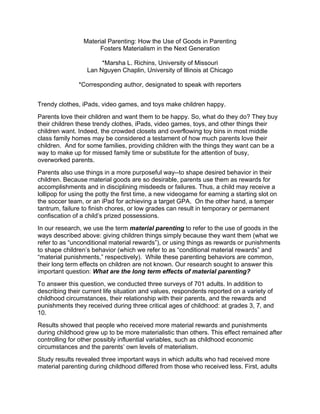
How Material Parenting Fosters Materialism
- 1. Material Parenting: How the Use of Goods in Parenting Fosters Materialism in the Next Generation *Marsha L. Richins, University of Missouri Lan Nguyen Chaplin, University of Illinois at Chicago *Corresponding author, designated to speak with reporters Trendy clothes, iPads, video games, and toys make children happy. Parents love their children and want them to be happy. So, what do they do? They buy their children these trendy clothes, iPads, video games, toys, and other things their children want. Indeed, the crowded closets and overflowing toy bins in most middle class family homes may be considered a testament of how much parents love their children. And for some families, providing children with the things they want can be a way to make up for missed family time or substitute for the attention of busy, overworked parents. Parents also use things in a more purposeful way--to shape desired behavior in their children. Because material goods are so desirable, parents use them as rewards for accomplishments and in disciplining misdeeds or failures. Thus, a child may receive a lollipop for using the potty the first time, a new videogame for earning a starting slot on the soccer team, or an iPad for achieving a target GPA. On the other hand, a temper tantrum, failure to finish chores, or low grades can result in temporary or permanent confiscation of a child’s prized possessions. In our research, we use the term material parenting to refer to the use of goods in the ways described above: giving children things simply because they want them (what we refer to as “unconditional material rewards”), or using things as rewards or punishments to shape children’s behavior (which we refer to as “conditional material rewards” and “material punishments,” respectively). While these parenting behaviors are common, their long term effects on children are not known. Our research sought to answer this important question: What are the long term effects of material parenting? To answer this question, we conducted three surveys of 701 adults. In addition to describing their current life situation and values, respondents reported on a variety of childhood circumstances, their relationship with their parents, and the rewards and punishments they received during three critical ages of childhood: at grades 3, 7, and 10. Results showed that people who received more material rewards and punishments during childhood grew up to be more materialistic than others. This effect remained after controlling for other possibly influential variables, such as childhood economic circumstances and the parents’ own levels of materialism. Study results revealed three important ways in which adults who had received more material parenting during childhood differed from those who received less. First, adults
- 2. who received material rewards as children are more likely than others to continue to use possessions to shape who they are when they are grown; they have come to believe— more than others—that material goods play a vital role in defining and expressing who they are. Second, they are more likely to believe that acquiring desired products will make them more attractive to others. Third, adults who received both material rewards and material punishments as children are more likely to admire people with expensive possessions and to judge success by the kinds of things people own. For all these reasons, adults who received more material parenting during childhood place more importance on material goods in general than their peers. Thus, in their efforts to make their children happy and shape their behavior through the use of material parenting, parents unintentionally pave the way for their children to become materialistic adults. The research suggests that adults who received many material rewards during childhood are likely to continue rewarding themselves with material goods when they are grown. This is a cause for concern at both the personal and the environmental levels. At the personal level, materialism in adulthood has been linked to reduced well-being, marital problems, and financial difficulties. At the environmental level, materialism is associated with overconsumption that leads to environmental degradation. The higher consumption levels of materialistic consumers contribute to greenhouse gas production and climate change, depletion of natural resources, and environmental pollution. The United States already out-consumes nearly every other economy in the world. Our findings suggest that material parenting may be setting the stage for long term over-consumption and consequent environmental harm. QUOTES: • “Our research suggests that children who receive many material rewards from their parents will likely continue rewarding themselves with material goods when they are grown—well into adulthood.” • “Our findings suggest that material parenting may be setting the stage for long term over-consumption and consequent environmental harm.” • “Reward practices can have a significant impact on the formation of values.” • “Our research highlights the value of examining childhood circumstances and parenting practices to understand the consumer behavior of adults.” • “An affluence of things during childhood is predictive of materialism in adulthood.”